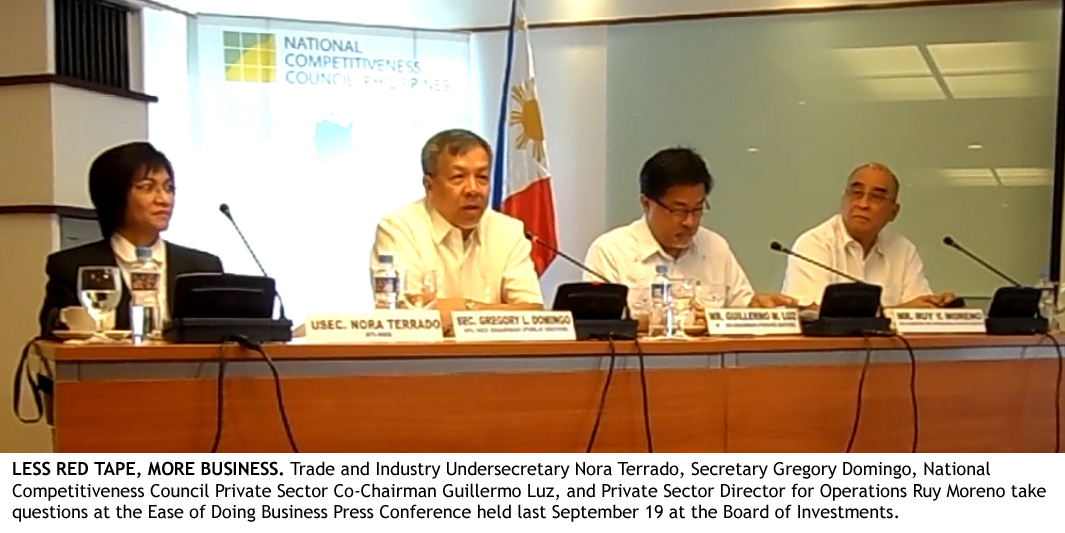- Home
- |
- About Us
- |
- Working Groups
- |
- News
- |
- Rankings
- WEF-Global Competitiveness Report
- Ease of Doing Business Report
- IMD-World Competitiveness Yearbook
- TI-Corruption Perceptions Index
- HF-Economic Freedom Index
- WEF-Global Information Technology Report
- WEF-Travel and Tourism Report
- WIPO-Global Innovation Index
- WB-Logistics Performance Index
- FFP-Fragile States Index
- WEF-Global Enabling Trade Report
- WEF-Global Gender Gap Report
- Gallery
- |
- Downloads
- |
- Contact Us
NCC Publishes Doing Business Reforms for 2013, Calls on Businessmen to Evaluate
In a clear bid to cut through bureaucratic red tape, the National Competitiveness Council released a comprehensive list of implemented reforms prepared by the inter-agency Task Force on Ease of Doing Business to simplify business regulatory practices for 2013. The reforms were presented earlier today by Department of Trade and Industry Secretary and National Competitiveness Council Chairman Gregory L. Domingo, together with NCC Private Sector Co-Chairman Guillermo M. Luz, Undersecretary Nora K. Terrado, and NCC Private Sector Director for Operations Ruy Y. Moreno.
The task force, established last May 2013 by virtue of Administrative Order No. 38, developed the reforms based on the Gameplan for Competitiveness designed by the NCC to raise Philippine competitiveness rankings to the top third in the world by 2016. The country is ranked 138th of 185 economies and 8th of nine ASEAN countries in the 2013 Doing Business Report of the World Bank-International Finance Corporation. The Report measures the ease with which a business undertakes ten processes with government agencies and other institutions over its typical life cycle.
The reforms have shortened the time it takes for starting a business (from 36 to 11 days), dealing with construction permits (from 84 to 61 days), getting electricity (from 50 to 36 days), and registering property (from 39 to 23 days). There was also a reduction in time to import goods from 14 to 12 days.
These improvements were accompanied by a decrease in the steps required for starting a business (16 to 11 steps), dealing with construction permits (29 to 17 steps), and getting electricity (5 to 4 steps). The number of tax and contribution payments has also been trimmed down from 47 to 14 through electronic systems.
Reviews of Philippine systems, laws, and cases on credit access and investor protection also pointed towards higher scores on the IFC-constructed indices on depth of credit information (from 3 to 5 out of 6), strength of legal rights (from 4 to 9 out of 10), extent of disclosure (from 2 to 7 out of 10), extent of director liability (from 3 to 9 out of 10), and ease of shareholder suits (from 8 to 10 out of 10).

As the NCC continues to work on boosting government efficiency in business transactions, Mr. Luz called on the private sector and the public at large to test the enhancements and provide recommendations on how they can be further improved, whether or not they will be reflected in international surveys. Secretary Domingo added that while survey rankings are good indicators of competitiveness, a competitive business environment is also marked by increased investments and job opportunities.

